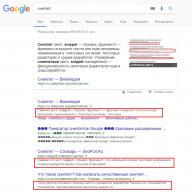The course is designed for programmers, developers and architects to achieve a high level of efficiency when developing in Delphi 2009.
Preliminary level of preparation:
- Knowledge of Windows at user level.
- Programming skills in Delphi.
- Familiarity with the principles of operation of database servers.
Purpose of the course- Increase development productivity with Delphi when developing, prototyping, coding and delivering applications for the Win32 platform.
This course is for those who want to deepen their knowledge and use the Delphi environment to develop VCL applications.
This course covers the fundamental benefits and features of the Delphi 2009 environment, including IDE customization, event programming, client/server development, data manipulation components, data transfer to the server, debugging, user interface development, exception handling, and using wizards to increase speed. development.
Lectures are accompanied by detailed laboratory work. Lectures and labs will lead students through the full development cycle and culminate in the creation of a full-fledged Win32 application.
Program of the course "Development of applications for the Win32 platform in Delphi 2009"
1. Introduction
- New in Delphi 2009
- Development of application requirements
2. Prototyping
- Application Prototype Development
- Application Forms
- Collection of user information
- Project setup
3. Object-oriented programming
- Classes and Objects
- Class boundaries
- Polymorphism
- Casting Object Types
- Class methods and class helpers
- Sealed classes
- Advanced OOP Concepts
4. Business logic and GUI
- Business rules and business logic
- What is interface code?
- Introduction to UML
- Introduction to Together
- Examples
6. Singleton Pattern
- What are templates?
- Singleton Pattern
- Application based on the Singleton pattern
7. Basic interface elements
- VCL architecture
- User interface development
8. Form Designer and Code Editor
- Introduction
- Form designer
- Creating an interface
- Code editor
9. Interface components
- Hierarchy of forms
- TAbstractForm
- Creating an interface
10. Object life cycle
- Object owner
- Creating objects
- Destruction of objects
11. Exception Handling
- Introduction
- What is an exception?
- Protected block
- Exception Handling
- Resource protection
- Raising and Rethrowing Exceptions
12. Debugger
- Debugging environment
- Code execution control
- Analyze data while the application is running
- Controlling the debugging process
13. Development of database applications
- Database Application Architecture
- Database Application Architecture in Delphi
- Data access technologies
- dbExpress
- TClientDataset
- Example
14. Delivery
- Application files
- DB Application
- Using packages
15.Model-View-Controller
- Description and benefits of the MVC approach
- Building an MVC Application
- XML Overview
- XML Patser
- XML and VCL Components
17.IntraWeb
- IntraWeb Components
- Application Module and Page Module
- Creating a database application
- Using Frames
- Start Ajax
18. RaveReports
- Rave Reports Components
- Visual Report Builder
- Changing report fields manually
- We look at the result
- Creating Reports in C++Builder Applications
19. DataSnap
- Data Snap Components
- Data Snap in the Object Repository
- Create a three-tier application
20. Application assembly
- Developing a Real Meeting Organizer Application Using All of the Above Techniques
21. Working with the project
- Create a project
- Project Manager
- Project file
- Project Settings
- Compiling and linking
- Assembly
- Events during build
- Using the MSBUild Utility
22.TeeChart
- TeeChart Components
- TeeChart Editor
At the end of the course, a final certification is carried out in the form of a test or on the basis of marks for practical work performed during the training process.
Delphi programming is the most popular direction among programmers. The Delphi programming environment, now called Embarcadero RAD Studio, is very easy to understand, but even it requires learning, as it contains many opportunities for the software developer!
Delphi lessons can be found in our time both at school and in higher educational institutions, but is there any sense in them? We doubt! After such a superficial training in Delphi, students cannot freely write any program. And this is a depressing fact. Often Delphi lessons are held “for show”, they say, they should have been in the curriculum, so they were. And no one thinks about whether learning delphi was useful for the listener. And there is nothing surprising here. Think about it, who teaches Delphi for the small wages teachers get? Who lectures Delphi? And lectures are given by those who could not find a well-paid job. It is these unfortunate teachers who go to conduct classes in various educational institutions and in Delphi courses. Nothing more can be expected from them. Therefore, our company, looking at such a shameful situation, opened Delphi courses on the basis of a manufacturing enterprise!
What will a delphi course given by employees of a manufacturing company give? These are not simple Delphi training courses that do not pay attention to the quality of education. This is the place where professional programmers do production tasks! Only an active Delphi programmer will be able to give good solid knowledge. Training for a delphi programmer should be carried out by a highly qualified programmer working in the industry!
Learning Delphi as well as any other programming language should be carried out on the so-called "combat" tasks. If in some dubious scientific center you will be given ridiculous and dull tasks, know that this is not good. It is our exclusive delphi programming courses that are as close as possible to the work that the trained person will perform at work. Only with us, delphi training courses will contain those tasks that will only strengthen the theoretical knowledge gained and at the same time be exciting and interesting!
Delphi learning does not tolerate distracted attention, both from the student and the teacher. That is why our organization conducts only individual lessons! The teacher will not wait until the whole class understands a topic or completes a task, while the most capable students are forced to languish in anticipation. The teacher will work with only one student, which will make delphi programming lessons as effective as possible!
If you are interested in programming in the broadest sense of the word and you set yourself a large-scale task - to learn to program, then the most rational solution for you would be to start with Delphi courses at the Specialist Center.
The Delphi visual programming environment, or RAD (Rapid Application Development) Delphi, was developed on the basis of the Pascal language (Pascal), created specifically for education. This language provides deep detailing and a large "margin of safety" in protection against wrong steps.
On the training coursesDelphi students will be able to learn how to develop projects in Delphi that demonstrate various aspects of programming in Delphi. The description of the project development stages is accompanied by comments, as well as examples of typical errors and shortcomings that may occur in similar situations. Special attention in the process learningDelphi focuses on how to effectively use the main components of the VCL library and how to create a convenient and reliable interface. CoursesDelphi will be useful not only for novice programmers, but also for experienced developers.
In addition, on coursesDelphi the possibilities of the programming system are considered Delphi 2010, the language is described Delphi, the visual components of the system and methods for their creation are considered. Special attention in the process learningDelphi paid to the principles and practices of creating network applications for different architectures, developing programs that support the main protocols of the Internet, tools for organizing the effective work of programmers.
Announcements of upcoming courses
Schedule for delphi courses
- Advanced training program - Enroll
| TITLE | NEAREST GROUP | TEACHERS | Price from | |||||
|---|---|---|---|---|---|---|---|---|
| Private faces | Organization | |||||||
So that you do not spend half your life figuring it out - in this article I will bring everything on a silver platter.
The topics of this article, to varying degrees, have already been touched upon more than once in this blog, but in this article they are collected in a heap, justifications are given. In short, a link to this article can be thrown at those who develop the DLL.
Important note: article must be read successively. Code examples are provided only as examples, at each step (point) of the article, the code of examples is added with new details. For example, at the very beginning of the article there is no error handling, "classic" methods are indicated (such as using GetLastError , sdtcall conventions, etc.), which are replaced by more adequate ones in the course of the article. This is done for the reason that "new" ("unusual") designs do not raise questions. Otherwise, with each example, one would have to insert a note of the form: "this is discussed in that paragraph below, but that - in this one here." In any case, at the end of the article there is a link to a ready-made code written taking into account everything said in the article. You can just take it and use it. And the article explains why and why. If you are not interested in "why and why" - scroll to the end to the conclusion and a link to download the example.




